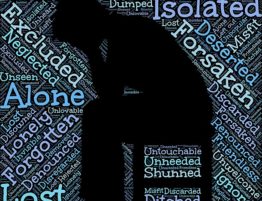
In recent time, there has been a growing number of people claiming to be healed of various ailments. Unfortunately many of these people are reported to have been re-infected with their sicknesses not long after being healed. I thank God for the genuine healings that occur, but what about the many who “get back sick” after being “healed”?
Main Points
-
- Losing your healing is a theoretical possibility, but a very rare event.
- The condition for losing your healing is sin, not unbelief.
- The relapse is worse than the original sickness.
- Most people who claim to have lost their healing nowadays were never healed in the first place.
DOWNLOAD FREE CHAPTERS FROM OUR NEW BOOKS
Scriptures
Matthew 12:43-45
43 “When an unclean spirit goes out of a man, he goes through dry places, seeking rest, and finds none.
44 Then he says, ‘I will return to my house from which I came.’ And when he comes, he finds it empty, swept, and put in order.
45 Then he goes and takes with him seven other spirits more wicked than himself, and they enter and dwell there; and the last state of that man is worse than the first. So shall it also be with this wicked generation.”John 5:14
14 Afterward Jesus found him in the temple, and said to him, “See, you have been made well. Sin no more, lest a worse thing come upon you.”
Getting back sick is possible
Admittedly the Bible does leave open the possibility of someone getting back a sickness. In Matt. 12:43-45 and John 5:14, Jesus teaches that people can become re-infected with sicknesses and demons after being healed.
However those are rare events. For one, it never happened in the life of Jesus or the apostles. Had it occurred, at least one of the writers of the Bible would have mentioned it. There was much investigation done into the miracles of Jesus (e.g. John 9:1-34), surely his detractors would not have missed such an opportunity to raise issue. They just never got the chance.
As it stands, this represents a teaching with no examples. There are not too many of those in scripture. That tells me that relapses are rare events. Why is it that so many today who claim to be healed today, report to have got back sick? Let us analyze the Biblical pattern.
Biblical Pattern
1. In both of the above passages, the condition after the relapse is worse than before the healing. Most people today who claim to get back sick have the same intensity of sickness before and after. That is not what the Bible said would happen.
2 Christians often claim that people got back sick because they lost their faith and allowed unbelief to enter. But according to John 5:14, the condition for getting back sick is sin not unbelief. “Go and sin no more” NOT “Go and doubt no more”. So it is incorrect to charge that someone got back sick because they “lost their faith”, “doubted their healing”, “allowed unbelief to enter”, or for any such nonsensical reason. The condition is sin, not unbelief.
3. Many people who get back sick report doing so hours or days after being healed. Matt. 12:43-35 did not say how long the demon wanders in the dry places looking for rest, but I can hardly imagine that it would be such a short period of time. I have heard of people who were said to be healed in a service, but got back sick before they could even leave the building. This is absurd!
Never healed in the first place
I am persuaded that the reason most people appear to get back sick is that they were never healed period. In Benny Hinn’s crusades, people claim to be healed of cancer, diabetes and drug addiction. How could they know they were healed of such sicknesses without medical confirmation? “They knew it by faith”. “They felt a physical sensation where the sickness was”.
But nay, people in the Bible knew they were healed when the sickness actually departed. “I was blind and now I can see” (John 9:25). That is why people in the Bible remained healed – they were genuinely healed. It is much easier to believe that someone would fake a healing testimony just to get up on stage to have the evangelist lay hands on him, than it is to believe that these ridiculous cases of relapses actually fit the Biblical pattern. Look at the scenario below.
A Day in the Life of a Counterfeit Miracle
A person, in a miracle crusade, claims to have been healed of AIDS. A few days later, that person is found to still have the virus. Most Christians pull the escape hatch right at this point: “They lost their faith and got back sick.” Denver Cheddie does not pull escape hatches. He prefers to analyze the claim to healing for authenticity.
No confirmation of healing
How did the person know he was healed of AIDS? Was it because he felt a warm sensation during the crusade? It might be useful to ask how he found out he had the disease in the first place. Surely he did not wake up one morning feeling goose bumps all over then concluded he was HIV positive. At least 2 doctors after testing his blood must have confirmed that he had AIDS. Doesn’t logic dictate that the only way to confirm the healing of a disease like AIDS is to have at least 2 medical doctors medically confirm that there is no longer any trace of HIV in his blood?
The problem with many in the Charismatic movement is that they have been brainwashed by positive thinking theology. To them, going back by doctors to “find out if they were really healed” is a “sign of doubting their healing” – the very unbelief which will cause them to get back sick. So they choose to “just believe” they were healed – even if they weren’t. So what do they do when, after so faithfully refusing to see the doctor, they still “get back sick”? They conclude that the very thought of going to the doctor caused them to lose their faith. Pitiful isn’t it? Such people would slander God before they ever question the authenticity of their favorite faith healers.
Jesus commanded people to get their healing medically confirmed
If they only knew that Jesus commanded people to have their healings medically confirmed, they would be liberated from this silent bondage. In Matt. 8:4; Mark 1:44; and Luke 5:14, the gospel writers relate a story of a leper who was healed. Jesus instructed him not to tell anyone of his healing but to show himself to the priest and offer the sacrifice Moses commanded.
Well what sacrifice did Moses command? Lev. 13:1-14:32 (cf. Deut. 24:8) are instructive. These verses deal with people with infectious diseases and how they were to be handled. In Lev. 14:3 the priest must examine the person who was healed of leprosy before declaring him clean. In other words, his healing had to be confirmed by the relevant authorities. Jesus basically instructed the leper to have his healing confirmed according to the custom of his day.
In our day, we are no longer under the ordinances of the Old Testament priestly system, but we do have avenues of confirming that healing has indeed taken place. If Jesus were on earth today, He would have told the man to go by a doctor and verify his healing, possibly even obtain a medical certificate. Then he could go around claiming he was healed.
Need for transparency
Consider the manner in which miracles are ascertained in Benny Hinn’s crusades. The person allegedly healed, informs one of the ushers that they were healed of such and such a disease. If the usher is convinced, the person gets to go up on stage and testify to the whole wide world. While on the stage, Hinn allows the person to testify of his healing after which the evangelist would lay hands on him, wave at him, breathe on him, or pelt him with air – as the Spirit would lead. The person is almost invariably slain in the Spirit (falls down).
The problem is that no investigation of the healing was ever conducted. It is my belief that many people who go up on that stage were never really healed. They lied about being healed to the ushers so that they could get a chance to go up on stage. What they wanted was to have the evangelist pray for them personally, because that is supposedly a more sure way of receiving their healing than “having faith from in the crowd”. As it turns out, he is equally unhealed. They don’t get back sick, they were never healed in the first place.
Assumptions are not sufficient
Another possibility is that these folk genuinely believe that they were healed, not because their symptoms went away, but because “the Word says so”, allegedly. They would take scriptures out of context (e.g. 1 Peter 2:24 – by his stripes you WERE healed) and believe that in the spirit realm, they were already healed. They believe this even though their symptoms still persist, choosing to believe instead that symptoms are decoys of the devil designed to make them doubt or question their true healing (which already took place in the spiritual realm).
As unbelievably stupid as this sounds, there are people in the charismatic movement who actually think this way. Talk about devaluing a miracle. Call me radical, but it used to be that when people were healed, their symptoms actually went away (John 9:25 – “I was blind, but now I see”). If healing does not entail the alleviation of symptoms, what good is it? It certainly does not match the Biblical standard of a miracle. It isn’t much of a miracle at all. Symptoms are a sign that the sickness is still present. If the symptoms don’t go away, then the person has not been healed. It is not a case of them getting back sick as much as they never having been (genuinely) healed in the first place.
Conclusion
In conclusion, there is the possibility of sickness and demons returning if a person continues to live in sin, but such are rare events. The reason most people appear to get relapses is that they were never genuinely healed in the first place.






